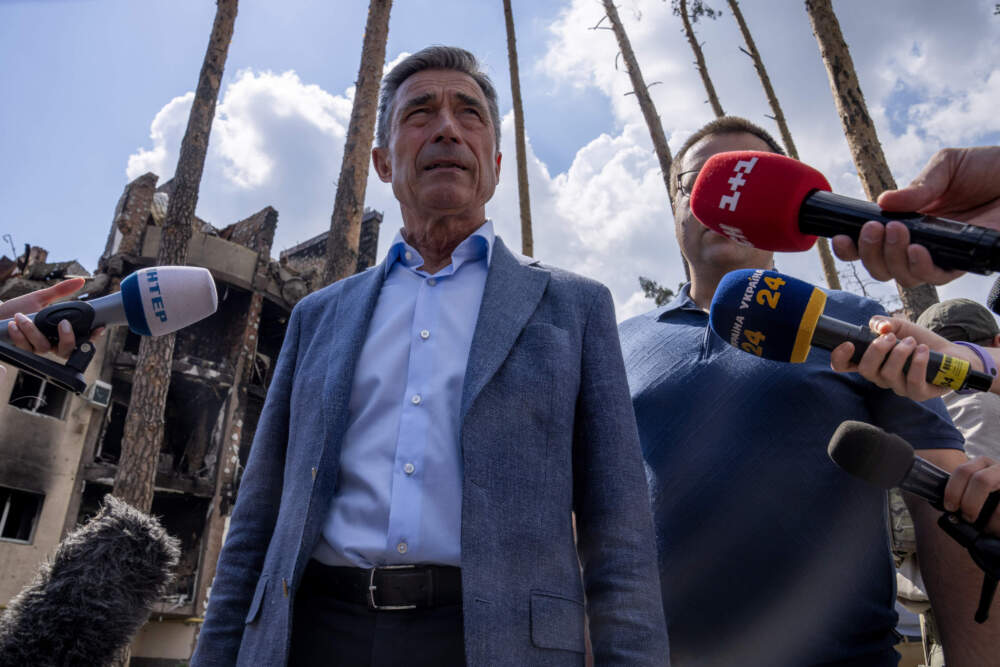 Former Secretary General of NATO Anders Fogh Rasmussen speaks to the press, during his visit to Irpin, on the outskirts of Kyiv, Ukraine, Friday, July 1, 2022. (Nariman El-Mofty/AP)
Former Secretary General of NATO Anders Fogh Rasmussen speaks to the press, during his visit to Irpin, on the outskirts of Kyiv, Ukraine, Friday, July 1, 2022. (Nariman El-Mofty/AP)
Three years to the day since Russian forces began an unprovoked invasion of Ukraine, more than a dozen world leaders are in Kyiv meeting with Ukrainian President Zelensky in a show of support as the U.S. and Russia seek to negotiate Ukraine’s future, perhaps without Ukraine.
President Trump has repeated Kremlin talking points and labeled Zelensky a dictator. This weekend, Zelensky said he’d be willing to step down in exchange for peace or NATO membership for Ukraine, something Russia long opposed and now Trump does as well.
NATO is the historic alliance forged after World War II as a defense against a future Adolf Hitler. The member nations pledged if any country is attacked, all are attacked.
But Sunday night, after Friedrich Merz’s party won the German election, he said that the U.S. is indifferent to his continent’s fate, that the future of NATO is in question, and that Europe must boost its own defenses.
Anders Fogh Rasmussen, NATO Secretary General from 2009 to 201 and former prime minister of Denmark, says this moment marks a seismic shift.
“I think [the] time has come for Europe to understand we have to stand [on] our own feet,” Fogh Rasmussen says. “We have to invest much more in our own security. We have to guarantee security of Ukraine in the future.”
5 questions with Anders Fogh Rasmussen
An analysis by the Brussels-based research institute Bruegel and the Kiel Institute for the World Economy estimates the cost of Europe defending itself without the support of the U.S. would be something like $250 billion a year. They’d need 50 additional brigades with a total of 300,000 new soldiers. Do you think this is possible?
“I think the pragmatic way of doing it in the short term would be to create a coalition of the willing countries in Europe that are capable and willing to do what is needed to create a strong force that can be deployed to Ukraine to guarantee security of Ukraine and prevent new Russian attacks”
President Trump in his first term made very clear his disdain for NATO. His theory that NATO countries weren’t pulling their weight and weren’t paying enough into it has been discounted. But should NATO and European leaders have been preparing for this long ago?
“ Yes, indeed. During my last summit as secretary general of NATO, we decided that within the next decade, that is before 2025, all allies should invest at least 2% of their [gross domestic product] in defense. At that time, only three did so. Last year, 23. out of 32 allies lived up to the 2% target. But I find it quite embarrassing.
“After the wake-up call, when [Vladimir] Putin attacked Ukraine, many European countries did still not live up to the 2% target. So that’s why it’s [a] really hard time. And in the meantime, the goalpost has moved. So I think the new goal should not be to invest at least 2% of GDP, but at least 4% of GDP to defend Europe against the Russian threat.”
Do you think it would have been impossible for this American president in this moment to scold Putin for his unprovoked invasion of Ukraine when Donald Trump also wants to take land from others around the world?
“ That’s exactly the problem. Trump uses almost the same language, the same rhetoric as Putin and Xi Jinping. My concern is that we are faced with a new world order where the big and strong countries will decide the destiny of the smaller and weaker countries, the United States, Russia, China. They will rule and divide.”
Do you think that Putin is going to stop at Ukraine?
“ If Putin gets any success, he won’t stop in Ukraine. He will continue.
“Next stop might be Moldova, where the Russians already have troops, then Georgia, where the Russians already have troops, then the Baltic States. So he won’t stop. [The] lesson learned from history is appeasement with the dictators does not lead to peace. It leads to war and conflict. And this is the reason why we have to keep a very firm position and not give unnecessary concessions to the Russians. Putin should not have any success in Ukraine.”
You said that you think this is time for Europe to step up and pay for much of its own defense. Are you saying this also with sadness?
“ Yes, indeed I am very sad because I have devoted all my political life to strengthen the alliance between Europe and the United States. The cornerstone of European security is and should be NATO. So, I strongly regret what we are witnessing right now, but we have to realize how the world has changed. We have to address this new security environment and be realistic. And we in Europe must work in the direction of a more fair burden sharing within NATO.”
Thomas Danielian produced and edited this interview for broadcast with Todd Mundt. Allison Hagan adapted it for the web.
This article was originally published on WBUR.org.
Copyright © 2025 WBUR